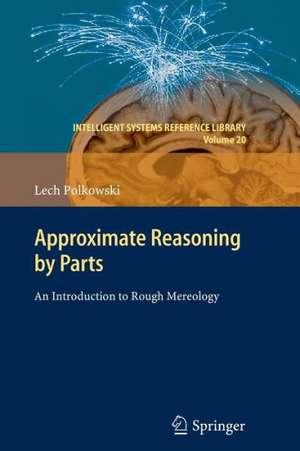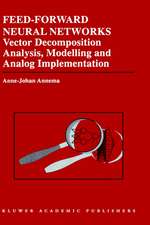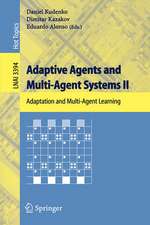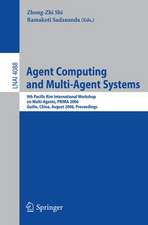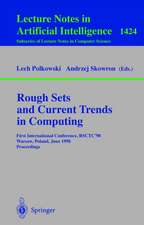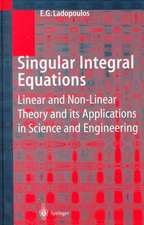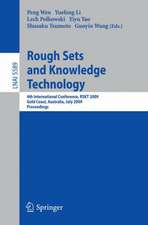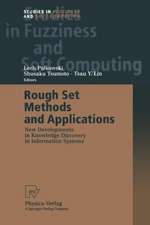Approximate Reasoning by Parts: An Introduction to Rough Mereology: Intelligent Systems Reference Library, cartea 20
Autor Lech Polkowskien Limba Engleză Paperback – 27 noi 2013
One can invoke here a formula Rough: Rough Mereology : Mereology = Fuzzy Set Theory : Set Theory. As with Mereology, Rough Mereology finds important applications in problems of Spatial Reasoning, illustrated in this monograph with examples from Behavioral Robotics. Due to its involvement with concepts, Rough Mereology offers new approaches to Granular Computing, Classifier and Decision Synthesis, Logics for Information Systems, and are--formulation of well--known ideas of Neural Networks and Many Agent Systems. All these approaches are discussed in this monograph.
To make the exposition self--contained, underlying notions of Set Theory, Topology, and Deductive and Reductive Reasoning with emphasis on Rough and Fuzzy Set Theories along with a thorough exposition of Mereology both in Lesniewski and Whitehead--Leonard--Goodman--Clarke versions are discussed at length.
It is hoped that the monograph offers researchers in various areas of Artificial Intelligence a new tool to deal with analysis of relations among concepts.
| Toate formatele și edițiile | Preț | Express |
|---|---|---|
| Paperback (1) | 1274.90 lei 43-57 zile | |
| Springer Berlin, Heidelberg – 27 noi 2013 | 1274.90 lei 43-57 zile | |
| Hardback (1) | 1281.17 lei 43-57 zile | |
| Springer Berlin, Heidelberg – 16 iul 2011 | 1281.17 lei 43-57 zile |
Din seria Intelligent Systems Reference Library
- 20%
 Preț: 1050.57 lei
Preț: 1050.57 lei - 20%
 Preț: 1157.60 lei
Preț: 1157.60 lei - 20%
 Preț: 648.44 lei
Preț: 648.44 lei - 20%
 Preț: 650.08 lei
Preț: 650.08 lei - 20%
 Preț: 1005.64 lei
Preț: 1005.64 lei - 5%
 Preț: 968.88 lei
Preț: 968.88 lei - 20%
 Preț: 1052.67 lei
Preț: 1052.67 lei - 20%
 Preț: 1171.46 lei
Preț: 1171.46 lei - 20%
 Preț: 1164.84 lei
Preț: 1164.84 lei - 20%
 Preț: 815.83 lei
Preț: 815.83 lei - 20%
 Preț: 989.96 lei
Preț: 989.96 lei - 20%
 Preț: 1063.41 lei
Preț: 1063.41 lei - 20%
 Preț: 504.37 lei
Preț: 504.37 lei - 18%
 Preț: 1113.26 lei
Preț: 1113.26 lei - 20%
 Preț: 1920.04 lei
Preț: 1920.04 lei - 20%
 Preț: 990.62 lei
Preț: 990.62 lei - 20%
 Preț: 651.57 lei
Preț: 651.57 lei - 20%
 Preț: 645.97 lei
Preț: 645.97 lei - 20%
 Preț: 660.16 lei
Preț: 660.16 lei - 20%
 Preț: 647.13 lei
Preț: 647.13 lei - 20%
 Preț: 654.05 lei
Preț: 654.05 lei - 20%
 Preț: 649.93 lei
Preț: 649.93 lei - 20%
 Preț: 648.11 lei
Preț: 648.11 lei - 20%
 Preț: 657.99 lei
Preț: 657.99 lei - 20%
 Preț: 656.84 lei
Preț: 656.84 lei - 20%
 Preț: 1624.04 lei
Preț: 1624.04 lei - 20%
 Preț: 642.98 lei
Preț: 642.98 lei - 20%
 Preț: 649.60 lei
Preț: 649.60 lei - 20%
 Preț: 651.23 lei
Preț: 651.23 lei - 20%
 Preț: 653.06 lei
Preț: 653.06 lei - 20%
 Preț: 1002.99 lei
Preț: 1002.99 lei - 20%
 Preț: 645.14 lei
Preț: 645.14 lei - 20%
 Preț: 658.33 lei
Preț: 658.33 lei - 20%
 Preț: 644.98 lei
Preț: 644.98 lei - 20%
 Preț: 646.62 lei
Preț: 646.62 lei
Preț: 1274.90 lei
Preț vechi: 1593.63 lei
-20% Nou
Puncte Express: 1912
Preț estimativ în valută:
243.96€ • 255.35$ • 203.05£
243.96€ • 255.35$ • 203.05£
Carte tipărită la comandă
Livrare economică 31 martie-14 aprilie
Preluare comenzi: 021 569.72.76
Specificații
ISBN-13: 9783642269851
ISBN-10: 3642269850
Pagini: 360
Ilustrații: XIV, 346 p.
Dimensiuni: 155 x 235 x 19 mm
Greutate: 0.51 kg
Ediția:2011
Editura: Springer Berlin, Heidelberg
Colecția Springer
Seria Intelligent Systems Reference Library
Locul publicării:Berlin, Heidelberg, Germany
ISBN-10: 3642269850
Pagini: 360
Ilustrații: XIV, 346 p.
Dimensiuni: 155 x 235 x 19 mm
Greutate: 0.51 kg
Ediția:2011
Editura: Springer Berlin, Heidelberg
Colecția Springer
Seria Intelligent Systems Reference Library
Locul publicării:Berlin, Heidelberg, Germany
Public țintă
ResearchCuprins
From the content: Concepts. Aristotelian and Set-theoretic Approaches.- Topology of Concepts.- Reasoning. Patterns of Deductive Reasoning.- Reductive Reasoning. Rough and Fuzzy Sets as Frameworks for Reductive Reasoning.- Mereology.
Textul de pe ultima copertă
--- PLEASE take the tex- version ---
The monograph offers a view on Rough Mereology, a tool for reasoning under uncertainty, which goes back to Mereology, formulated in terms of parts by Lesniewski, and borrows from Fuzzy Set Theory and Rough Set Theory ideas of the containment to a degree. The result is a theory based on the notion of a part to a degree.
One can invoke here a formula Rough: Rough Mereology : Mereology = Fuzzy Set Theory : Set Theory. As with Mereology, Rough Mereology finds important applications in problems of Spatial Reasoning, illustrated in this monograph with examples from Behavioral Robotics. Due to its involvement with concepts, Rough Mereology offers new approaches to Granular Computing, Classifier and Decision Synthesis, Logics for Information Systems, and are--formulation of well--known ideas of Neural Networks and Many Agent Systems. All these approaches are discussed in this monograph.
To make the exposition self--contained, underlying notions of Set Theory, Topology, and Deductive and Reductive Reasoning with emphasis on Rough and Fuzzy Set Theories along with a thorough exposition of Mereology both in Lesniewski and Whitehead--Leonard--Goodman--Clarke versions are discussed at length.
It is hoped that the monograph offers researchers in various areas of Artificial Intelligence a new tool to deal with analysis of relations among concepts.
The monograph offers a view on Rough Mereology, a tool for reasoning under uncertainty, which goes back to Mereology, formulated in terms of parts by Lesniewski, and borrows from Fuzzy Set Theory and Rough Set Theory ideas of the containment to a degree. The result is a theory based on the notion of a part to a degree.
One can invoke here a formula Rough: Rough Mereology : Mereology = Fuzzy Set Theory : Set Theory. As with Mereology, Rough Mereology finds important applications in problems of Spatial Reasoning, illustrated in this monograph with examples from Behavioral Robotics. Due to its involvement with concepts, Rough Mereology offers new approaches to Granular Computing, Classifier and Decision Synthesis, Logics for Information Systems, and are--formulation of well--known ideas of Neural Networks and Many Agent Systems. All these approaches are discussed in this monograph.
To make the exposition self--contained, underlying notions of Set Theory, Topology, and Deductive and Reductive Reasoning with emphasis on Rough and Fuzzy Set Theories along with a thorough exposition of Mereology both in Lesniewski and Whitehead--Leonard--Goodman--Clarke versions are discussed at length.
It is hoped that the monograph offers researchers in various areas of Artificial Intelligence a new tool to deal with analysis of relations among concepts.
Caracteristici
An Introduction to Rough Mereology Recent research on Approximate Reasoning Written by a leading expert in the field
